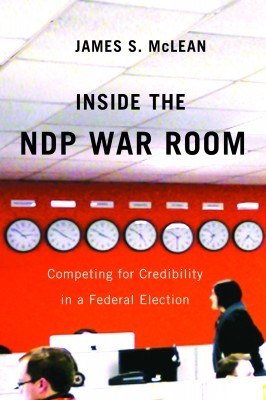“Of what value is the opinion on any subject, of a man of whom everyone knows that by his profession he must hold that opinion?” –John Stuart Mill
If there is one political profession even less reputable than that of the career politician, it is that of the party spin doctor. Despite their corrupt image, most politicians expend a good deal of energy helping out their constituents – sometimes out of a cynical desire to get re-elected, but other times out of genuine concern for their fellow citizens. Spin doctors, however, spend their days trying to twist the truth to the benefit of their own party and the detriment of others. It’s easy to see this profession as a pernicious one with purely baleful consequences.
James S. McLean’s Inside the NDP War Room gives a refreshingly nuanced account of the role played by spin doctors.A professor of journalism at Concordia University, McLean acknowledges the dangers posed by party strategists to public discourse, but he also points out that these strategists can play a constructive role by challenging the positions and records of opposing parties.
McLean repeatedly draws attention to the limits faced by party strategists when trying to spin the truth to their advantage. In pluralistic democracies like Canada, even the mightiest party machines will find their influence curtailed by rival parties, by the traditional media, and by the ever-vigilant blogosphere. Party strategists can’t conjure facts out of thin air without losing credibility; they therefore focus their efforts on “framing” truths or half-truths without painting outright falsehoods.

Inside the NDP War Room
Competing for Credibility in a Federal Election
James S. McLean
McGill-Queen’s University Press
$29.95
paper
222pp
9780773540934
Although the publisher is trying to reach a broad public, this is very much a book written to impress the academic community, with endnotes full of references to heavyweight theorists like Jürgen Habermas and Pierre Bourdieu (the latter provides McLean with the analytical lens through which he views his subject).
Unless they’re used to the conventions of academic writing, political junkies aren’t likely to slog through this book’s theory-laden second chapter.Those who do read past that chapter to the book’s end will come across no startling revelations about the NDP’s activities. McLean was allowed access to the party’s war room during the 2005–2006 federal election campaign; he was also included on the electronic list-serve used by NDP operatives during a part of that campaign. Unfortunately, this experience was of limited value. McLean has useful insights into the role of party strategists, but few of these insights seem to have been sparked by his experience in the war room of a campaign that turned out to be rather uneventful for the NDP (in 2006, the party increased its number of seats by ten and raised its share of the popular vote by 1.8%). The book’s only dramatic section is its brief analysis of the NDP’s electoral breakthrough during the 2011 federal election. One can’t help but wish that McLean had been imbedded in the NDP’s war room during that far more pivotal moment in the party’s history.
This book’s value lies not so much in the modest insights garnered from the author’s short time in a party war room, but in its balanced analysis of communication strategy in the Internet age. McLean describes a public relations battlefield in which each party seeks to promote its own vision of the social world. In doing so, a party encounters resistance from a variety of forces: political opponents who contest that vision, fact checkers in the traditional media and on the Web, and the shifting changes of fortune. McLean points out that no party can impose its view of the world with impunity, for a party whose views are blatantly at odds with reality loses credibility with the public. Moreover, spin doctors who spout vitriolic rhetoric or engage in outrageous behaviour run the risk of losing legitimacy with voters outside their party’s core base (a fact borne out by the recent American presidential election).
Inside the NDP War Room undermines the notion that party strategists control a helpless public through their Machiavellian arts. So long as other political actors remain vigilant, the power of spin doctors to do harm remains limited. By scrutinizing rival parties as they do, spin doctors may even contribute in a small way to the public good. mRb







0 Comments